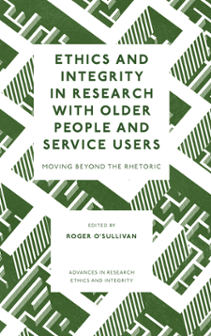
Appendix
Ethics and Integrity in Research with Older People and Service Users
ISBN: 978-1-80455-423-4, eISBN: 978-1-80455-422-7
ISSN: 2398-6018
Publication date: 24 November 2023
Citation
(2023), "Appendix", O'Sullivan, R. (Ed.) Ethics and Integrity in Research with Older People and Service Users (Advances in Research Ethics and Integrity, Vol. 9), Emerald Publishing Limited, Leeds, pp. 195-196. https://doi.org/10.1108/S2398-601820230000009019
Publisher
:Emerald Publishing Limited
Copyright © 2024 Roger O’Sullivan. Published under exclusive licence by Emerald Publishing Limited
Getting Involved in Ageing Research: A Guide for the Community and Voluntary Sector
Ten Things You Need to Think About
When getting involved in a research project with a research partner you might want to ask a series of questions relevant to the design, delivery and dissemination of research.
Is it clear who the research is for and why you are asked to be involved, and do you feel that the stakeholders are properly mapped out in community and voluntary organizations and older people are clearly defined as beneficiaries?
How useful is the research to you and older people you work with? Can you easily identify the likely value or impact of the project and can these be strengthened, for example through stronger involvement of older people, users and community and voluntary organizations, and through a stronger link to policies and services?
Have you influence on how your organization and older people could be appropriately and effectively involved in the research project?
Have the ethical implications of the research been clearly explained to you; are there risks or potential harm to older people; can the design and delivery of the project be improved to address any ethical concerns?
What impact will the research have on you as a participant? Does it have implications for your services, capacity to participate, reputation or resources (is there a cost to you or the older people to participate)? For new projects will you be named as a co-applicant in grant applications and will there be a specific budget covering your involvement?
Are there appropriate organizational structures and management arrangements in place to enable you and, where relevant, older people to participate properly in the key stages of the research?
Is it appropriate and if so is there potential for older people to play a role in data collection; what is the level of commitment required, for example what support and training will they receive?
Are you given an opportunity to comment on the methodology to ensure user involvement in the design, management and implementation of the project?
Is there a dissemination strategy in place which is useful to community and voluntary organizations and will it produce findings in ways that are accessible to older people and advocates?
Do you, your organization and, where relevant, older people have the skills and resources to participate in the research effectively?
In summary, you need to be clear about the research aims, what you are being asked to get involved with, your role and responsibilities and the implications including resources, time commitments and older people's well-being. It also suggests that research is conducted in ethical and meaningful ways that respects the interest of older people and community and voluntary organizations in the design and use of the data collected.
Reference
CARDI. (2015) CARDI . (2015). Getting involved in ageing research: A guide for the community and voluntary sector. Centre for Ageing Research and Development in Ireland (CARDI).
- Prelims
- Section 1 ‘Views From the Researchers’
- Chapter 1 Theory and Practice of User-Involved Research
- Chapter 2 Navigating Person-Centred Ethics: A Sensory Ethnographic Study Involving Older People Living With Dementia and Family Carers
- Chapter 3 Incorporating Older Adult Voice Into Meaningful Research – ‘It's About Time’
- Chapter 4 Family Conflict in Dementia Caregiving: Maintaining Research Ethics and Integrity
- Chapter 5 Ethical Issues in Research With Vulnerable People: A Case Study
- Section 2 ‘Views From the Researched’
- Chapter 6 Involving Lay Members of the Public in Research – Reflections and Insights
- Chapter 7 Ethics, Integrity and Co-production in Mental Health Research
- Section 3 ‘Views From Those Who Fall In Between’
- Chapter 8 Research With Older Adults in American Indian Communities – Understanding Knowledge, Power and Practice
- Chapter 9 Engaged Research as Team Science Reflections From the ‘Researcher’ and the ‘Researched’
- Chapter 10 Trying the Patience of Patients: A Personal Reflection
- Appendix
- Further Reading and Resources
- Glossary
- Index